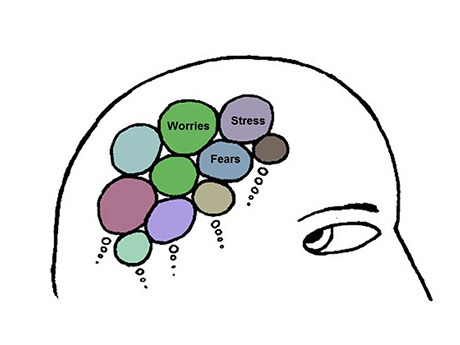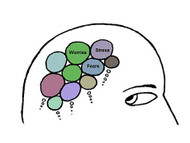Dealing With Fear, Stress And Anxiety
Apr 21st 2021
Posted by Stephanie Chambers
by Stephanie Chambers and Dr. Christoph Streicher

My husband and I recently watched a movie called “After Earth,” starring Will Smith and his real life son Jaden Smith, based on a story written by Will Smith. It didn’t get great ratings, but we enjoyed it. At one point, there was a line we both liked so much that we pressed pause, replayed it, and wrote it down. I might mention that my husband is a marriage and family therapist. I just looked it up online, and other people have quoted it too:
“Fear is not real. The only place that fear can exist is in our thoughts of the future. It is a product of our imagination, causing us to fear things that do not at present and may not ever exist. That is near insanity, Kitai [his son’s name]. Do not misunderstand me: Danger is very real, but fear is a choice. We are all telling ourselves a story and that day, mine changed.”
In the movie, the savage blind animals could only detect you and then attack you if you were afraid of them. Although our lives aren’t as dangerous as this, most of us have experienced fear at some point or another in our lives.
HOW DOES THIS RELATE TO STRESS?
Stress is our body’s normal response to an imminent danger. You may have heard of it being referred to as the “fight or flight” response. Our body produces cortisol, adrenaline and noradrenaline as a result. These in turn cause a cascade of responses designed to help us become prepared to deal with this “danger.”
Problems arise, just as this quote explains, when we feel fear or stress and generate these chemicals when there isn’t a danger – just our overworking mind. When these chemicals are produced and they aren’t use to fight or flee a situation, then they cause negative consequences in the body.
Of course, we have to plan and prepare for the future, but that doesn’t mean we have to worry or feel anxious about it.
The American Psychological Association says there are three types of stress: acute stress, episodic acute stress, and chronic stress.
WHAT ARE THE SYMPTOMS OF STRESS?
Common symptoms of stress include a pounding heart, breathing faster than normal, sweat, tension and headaches, back pain and an upset stomach, diarrhea or nausea. Over the long term, if you feel stressed often, stress can increase your blood pressure or affect your heart in other ways, reduce your body’s immunity, cause shoulder, neck or back pain, make some types of arthritis worse, lead to stomach and digestion issues (or make those you already have worse), make skin conditions worse, and make asthma and chronic obstructive pulmonary disease worse. Stress is linked to period pain, erection issues and lower fertility.
Being stressed all the time can also affect your personality and make you jumpy, irritable and not a pleasure to live with.
HOW CAN YOU OVERCOME FEAR?
As alluded to in the movie, consciously deciding not to be afraid can help if your stress is because of fear. I know as a child I was afraid of snakes – mainly, I think, because my parents had told stories of killing snakes and of finding them in their houses when they were growing up. I was so afraid that I often made one of my parents sleep with me.
It wasn’t until I read a book by Anthony Robbins called “Awaken The Giant Within” and its section on fear that I finally decided not to be afraid any more. Now, when I am lucky enough to see a snake, I consider it a blessing and I notice their beauty. That’s not to say that I am not cautious, and I certainly don’t approach a snake, but having the right attitude can help you to not experience stress caused by fear.
Another example of this was that as a child I was afraid of rides. I would only go on the mini-Ferris wheel, not the big one, for example. Then, when I was around eighteen years old, one of my teachers had arranged really cheap tickets to a place with lots of rides (because her father worked there), and I decided to just not be afraid any more. I went on all the rides. I went on more than anyone else did, and I had the time of my life.
Essential oils can also be used to help you to temporarily overcome fear (e.g. feeling scared or afraid for no reason). The following essential oils have traditionally been used for this:
- Ylang Ylang – good for high blood pressure and mood enhancing
- Bergamot – mood enhancing, calming
- Myrrh – centering.
HOW CAN YOU REDUCE STRESS?
Some types of stress aren’t caused by a specific fear or event. Sometimes, people experience panic attacks and anxiety for no clear reason. But there are things that can make you feel stressed, like health issues, emotions you can’t express, relationship problems, financial problems, major life changes, or living a life that conflicts with your core beliefs. Living in crowded, noisy environments can also add to your stress levels. Stress can also be caused by trauma, as we covered recently in a blog about Post Traumatic Stress Disorder (PTSD). We go into more detail about what causes stress and anxiety on our page Essential Oils For Anxiety and Stress.
I am currently listening to an audio book by Amy Cuddy (famous for her TED talk) called Presence: Bringing Your Boldest Self To Your Biggest Challenges. It refers to a lot of research showing that the body affects the mental states in very direct ways. For example, even doing something simple like putting a pencil across your mouth, forcing yourself to smile, and holding that position for a while can actually make you feel happier. Some studies have even shown that Botox helps depression (although it’s not actually recommended for many other reasons).
Some psychotherapists, my husband included, find that because stress and anxiety are often related to an overactive mind, and calming the mind by focusing on specific things in the body (e.g. feeling your toes) can help calm panic attacks. Doing regular exercise and yoga and breathing exercises can also help, and there is a lot of research quoted in the Presence book to back this up. Some people find essential oils like Vetiver, Himalayan Cedar and Cedar Atlas also help you to feel more grounded in this way.
There has been research 1-4 showing that the Transcendental Meditation (TM) technique decreases cortisol levels. A Stanford University analysis5 of 146 independent studies also found that the TM technique is twice as effective at reducing trait anxiety when compared with concentration, contemplation or other techniques. Maybe it wasn’t a coincidence that I finally overcame my fear of snakes and rides after I had learned to meditate.
The following essential oils have also been traditionally used for anxiety and stress:
- Lavender – the general healer, which helps with almost everything – certainly with the conditions addressed in this blog. However, it is not as powerful as some other oils, which are more specialists.
- Roman Chamomile – one of the most powerful for muscle tensions and muscle cramps – as powerful as any synthetic spasmolytic.
- Ylang Ylang – good for high blood pressure and mood enhancing.
- Myrrh – centering.
- Neroli – provides inner calm.
- Geranium – balancing, in particular to the female endocrine system.
- Bergamot – mood enhancing, calming.
- Sweet Marjoram – the biggest stress buster of them all. Extremely sedative and good for high blood pressure, muscle pain, and insomnia. Not suitable during daytime when you need to stay focused.
A Korean study 6 showed that diffusing Lavender, Ylang Ylang and Bergamot essential oils “reduces psychological stress responses and serum cortisol levels, as well as the blood pressure of clients with essential hypertension”.
A study 7 on pregnant women showed that inhaling Rose essential oils and having them in a footbath for 10 minutes significantly reduced anxiety levels as assessed using the visual analogous scale (VASA).
Another study 8 showed that rats that inhaled Vetiver essential oil had reduced anxiety.
Some of Amrita’s blends include some of these essential oils:
- Anxiety Free Roll-On Relief or Synergy
- Stress Free Roll-On Relief or Synergy
- Deep Rest Roll-On Relief or Synergy
- Quit Craving Roll-On Relief or Synergy
- A Woman's Balance Roll-On Relief or Synergy
- Menopause Roll-On Relief.
It is matter of trying the oils or blends and seeing which one resonates with you and has the best effects in terms of reducing your anxiety or stress.
If using the roll-ons or a dilution of the synergy, we recommend that you put your attention on your body and notice if there is unrest in one part. Then apply the blend on this part of your body, close your eyes and let your awareness stay there for a while. That’s because we also believe strongly in the mind-body connection.
What have you found useful in overcoming stress? We would love to hear. Please comment below.
Sources:
- http://www.sciencedirect.com/science/article/pii/0018506X78900247
- Journal of Biomedicine 1 (1980): 73–88.
- Clinical and Experimental Pharmacology and Physiology 7 (1980): 75–76.
- Experientia 34 (1978): 618–619.
- Journal of Clinical Psychology, 45 (1989): 957–974.
- http://www.ncbi.nlm.nih.gov/pubmed/17211115
- http://www.ncbi.nlm.nih.gov/pmc/articles/PMC4270653/
- http://www.ncbi.nlm.nih.gov/pubmed/25553641
Disclaimer: The statements made on this page have not been evaluated by the U.S. Food and Drug Administration (FDA). They are not intended to diagnose, cure or prevent any disease. If a condition persists, please contact your physician or healthcare provider. The information provided is not a substitute for a face-to-face consultation with a healthcare provider, and should not be construed as medical advice
Original Published: 2016-03-15 / Last Modified: 2021-10-11

